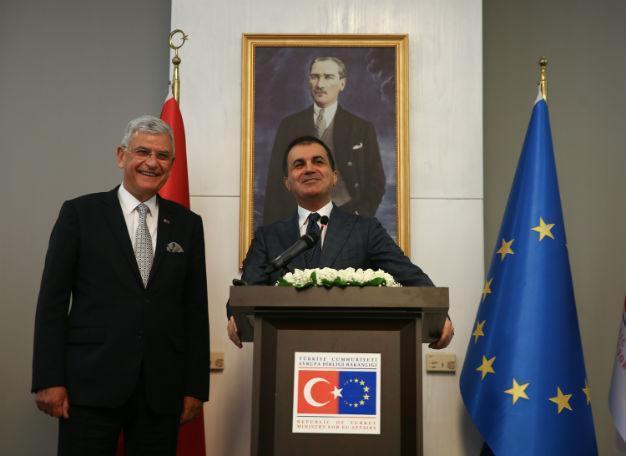New minister: EU isn’t sole option for Turkey
ANKARA

AA photo
Turkey’s relationship with the European Union is important but it is not the “only option” for Ankara, Ömer Çelik, Turkey’s new minister for EU affairs, said on May 25.Çelik, who replaced Volkan Bozkır in the new cabinet named by Prime Minister Binali Yıldırım, also told reporters that Turkey wanted the EU to drop its “double standards” in the fight against terrorism.
Çelik made the comments in a ceremony in which he took over the post from Bozkır. Turkey-EU ties have been tense over the bloc’s demand that Ankara fulfill all 72 agreed criteria – including a controversial one on terrorism – in order to lift visa obligations for Turkish citizens, as part of the deal on Turkey readmitting refugees to Europe.
Turkish President Recep Tayyip Erdoğan on May 24 warned the EU that the Turkish Parliament would block laws related to the landmark deal to stem the flow of migrants to Europe if Ankara was not granted its key demand of visa-free travel.
“If that [visa exemption] does not happen ... then no decision and no law in the framework of the readmission agreement will come out of the parliament of the Turkish Republic,” Erdoğan said at the closing ceremony of the World Humanitarian Summit in Istanbul.
Turkey is not “bluffing” or uttering “threats” when it says it could suspend all agreements signed with the EU, including the readmission agreement, Foreign Minister Mevlüt Çavuşoğlu said on the same day, adding that the EU needed to be “fair” to Turkey.
Disagreements have emerged on Turkey’s counter-terrorism law, which Brussels wants to see brought in line with EU standards, prompting reactions from Turkey, which says it cannot change its anti-terror law while fighting both the outlawed Kurdistan Workers’ Party (PKK) and the Islamic State of Iraq (ISIL).
Meanwhile, German Chancellor Angela Merkel said May 25 that she was not worried about the migrant pact between the EU and Turkey, but more time was needed to address sticking points on visa liberalization for Ankara.
“I am not worried,” Merkel told reporters after a cabinet meeting near Berlin, according to Reuters. “Maybe some issues will require more time, but in principle we, for our part, will stick to the agreement.”
German cabinet approves measures for asylum-seekers
Merkel’s cabinet approved on May 25 a raft of new measures combining “opportunities and obligations” designed to help Germany deal with the influx of some 1.1 million asylum-seekers registered as entering the country last year and help those who stay to become “good neighbors and citizens.”
The package seeks to provide migrants with better access to the German job market and also foresees the creation of 100,000 government-funded “job opportunities” for migrants, the Associated Press reported. At the same time, migrants will be expected to participate in expanded orientation and language courses, which will also be made available more quickly and to more people than before.
“Learning the German language quickly, rapid integration in training, studies and the labor market, and an understanding of and compliance with the principles of living together in our society and compliance with our laws are essential for successful integration,” the cabinet said in a statement after the meeting. “The newcomers are to become good neighbors and citizens, which will enable us to strengthen social cohesion and prevent parallel structures in our country.”
In a provision designed to prevent the development of migrant ghettos in big cities, the measures, which still need parliamentary approval, would mandate newcomers to stay where they have been officially placed for a minimum of three years unless a job is found that takes them elsewhere.
Merkel told reporters that Germany has “learned from the past,” when immigrants were frequently thought of as guest workers or otherwise temporary residents and integration measures were not offered. Now that they are, “we expect people to take up these offers so that integration can work better.”
“I think it’s a milestone that the federal government is passing an integration law that’s based upon the principle of opportunities and obligations, obligations and opportunities,” she said.
















